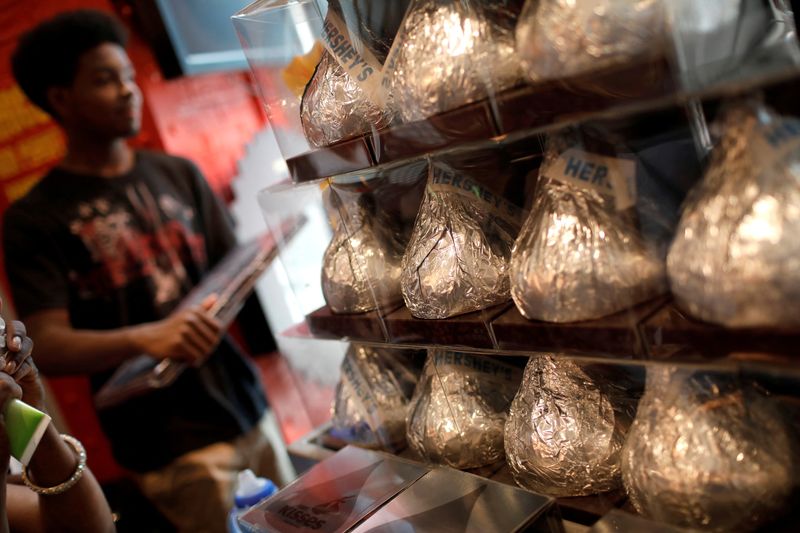By Maytaal Angel and Jessica DiNapoli
LONDON/NEW YORK (Reuters) - Consumers are cutting back on chocolate due to the cost of living crises in Europe and the United States, according to new data and comments from executives at the world's biggest chocolate companies.
Overall U.S. chocolate retail sales volumes have been "off and down" 2% to 3% over the last couple of months as prices have risen in the "high single-digit, low double-digit" range, said Hershey Co (NYSE:HSY) vice president of investor relations Melissa Poole in an interview with Reuters. Hershey's performance closely tracks the rest of the chocolate category.
"We are expecting that as we move through the year... we will see a bit of pull-back in volume," Poole said. Hershey has previously flagged that it expected a softening in demand. Until the recent dip, "consumers haven't really reduced consumption much at all," she said.
Chocolate sales, particularly in the United States, ballooned along with purchases of many consumer products in the later stages of the coronavirus pandemic, with shoppers buoyed by government stimulus payments and sticking with "homebody lifestyle" habits such as buying in bulk.
But chocolate companies are now seeing some consumer behavior change - for instance, shoppers choosing individual candy bars at the register instead of multipacks.
According to Chicago-based market researcher IRI, the volume sold of chocolate products in the United States dropped 1.5% versus a year ago in the 13-weeks ended June 12 as prices soared 8.2%.
"We're going to see chocolate becoming more sensitive to price. Consumers will treat themselves, but it will be smaller sizes, a small treat. That's why you're seeing (a sales) volume decline," said Daniel Sadler, a principal at IRI.
IRI data also showed sales volumes of U.S. store-brand or "private-label" chocolate, a minor part of the overall market that is cheaper than name-brand chocolate, grew by 8% in the last six months.
In Britain, consultants McKinsey found 40% of Britons traded down to cheaper products in both snacks and confectionery in the four to six weeks ended mid-May.
Cheaper chocolate has a lower cocoa content, meaning even if chocolate makers' sales volumes stay the same in a downturn, cocoa demand would fall.
The Russian invasion of Ukraine has also impacted demand, traders and experts say, with the two countries together accounting for 5% of usual global cocoa demand.
Some chocolate makers, including majors Lindt and Nestle, withdrew from or reduced sales in Russia this year to protest the invasion. But Lindt said the impact of that move on its finances would be small.
SHRINKFLATION
Hershey in recent months has been using its new fulfillment center in Annville, Pennsylvania to more easily and efficiently serve retailers such as mass discounters and dollar stores whose customers are very sensitive to price, Poole said.
"For those who have the money and have the space to store bigger bags, value to them is cheaper price per pound," Poole said. "Value to others might be something 'accessible to me' at an absolute lower price point."
Hershey in certain cases slims down package size and keeps the price similar - commonly known as "shrinkflation" - to retain customers who say they only have $3 to spend on a bag of chocolate Kisses, rather than $5 or $6, Poole said. It has not used this tool "as often as you might think" because of the time and planning involved, she said.
"Inflation has been so significant, we rely more on list price increases," Poole said. About 20% of Hershey's products are below $2, down from 25% in April.
However, over the last 18 months the company has taken weight out of some seasonal items, Poole said.
Shrinkflation, like trading down to cheaper chocolate, impacts cocoa demand even if item sales volumes stay the same.
Chocolate makers originally expected cocoa demand to grow some 2.5% this year, but are now seeing growth of just 1%, followed by no growth next year if inflation persists and the Russia-Ukraine war continues, traders and experts say.
Mondelez (NASDAQ:MDLZ), which makes Cadbury and Milka chocolate, has also "made the decision to slightly reduce the weight of certain products," said spokesperson Tracey Noe in an email. Cadbury Dairy Milk bars sold in the UK are now smaller.
Mondelez CEO Dirk Van de Put said last month at a conference the company is "doing everything that's in (its) power to prepare for potentially a consumer that reacts" to price hikes and an economic recession, including investing in advertising.
